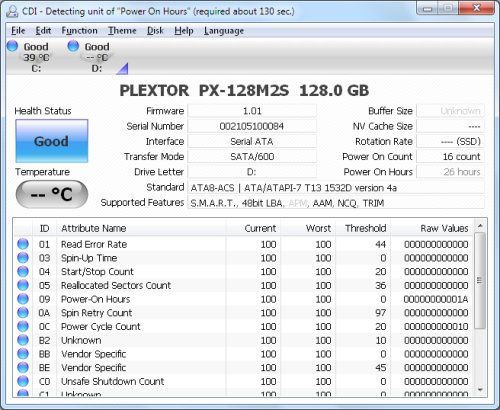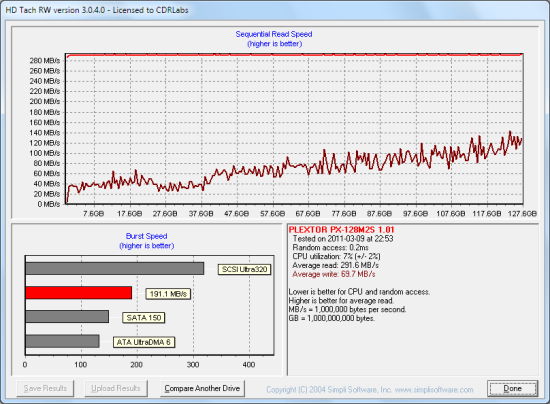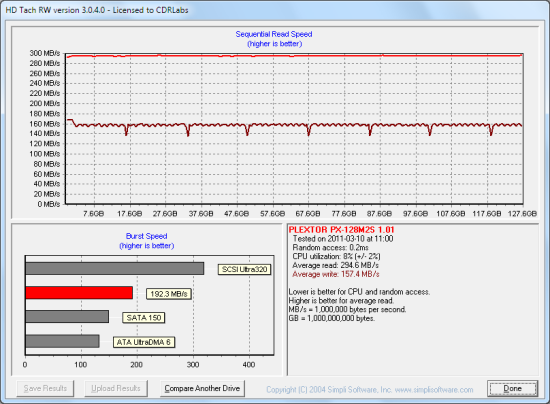TRIM and Instant Restore:
While SSD's offer many benefits, there are some downsides to using flash memory. One of the biggest issues people run into is performance degradation. Over time, an SSD will run out of fresh blocks and will have to write over data the file system has marked as deleted. This procedure is very complicated and can slow an SSD's write speeds considerably.
To fix this problem, most manufacturers have added TRIM support to their SSDs. The TRIM command allows an operating system, such as Windows 7, to tell an SSD which data blocks are no longer in use. Using this information, the drive pro-actively erases these blocks and adds them to the free block pool.

Unlike Plextor's original PX-M1 series SSDs, the PX-128M2S supports TRIM out of the box. To see how well their implementation of TRIM worked, I tried to put the drive in a "dirty" state. This was easier said than done though thanks to Plextor's new Instant Restore technology. This advanced garbage collection technique maintains "like new" performance by reorganizing data to maximize the number of free cells. Instant Restore does an excellent job of this as I saw very little performance degradation, even after hours of testing.

Plextor PX-128M2S - Dirty
I was finally able to overwhelm Instant Restore by using Iometer to fill the entire drive and then running a random write test for 20 minutes. Looking at the screenshot above, you can see that the PX-128M2S's average write speed dropped to a mere 69.7 MB/s when in this "dirty" state.

Plextor PX-128M2S - Clean
To see how well the PX-128M2S could recover, I let the computer sit overnight and then reran the test. While the drive wasn't able to reach the factory fresh performance shown in our earlier tests, its average write speed jumped up to 157.4 MB/s.
Final Thoughts:
Despite their success in the storage industry, Plextor's initial SSD offerings did not go over as well as many expected. The performance of the PX-M1 series was average at best and the garbage collection technology was a poor substitute for TRIM. Plextor has apparently taken these criticisms to heart as the PX-128M2S is an entirely different beast. Thanks to its Marvell 88SS9174 controller and SATA 6Gb/s interface, the drive performed very well in our sequential read and write tests, reading at speeds as high as 393 MB/s and writing at speeds in excess of 200 MB/s. The PX-128M2S didn't perform quite as well when doing random reads and writes. However, this was offset somewhat by Plextor's Instant Restore technology which did a great job of maintaining "like new" performance, even after long periods of use.
Another thing Plextor seems to have learned a bit about is price. Where the PX-M1 series commanded a hefty price tag, the PX-128M2S and the rest of the drives in the PX-M2 series are actually reasonably priced. Prices range from $180 for the PX-64M2S up to $570 for the PX-256M2S. The PX-128M2S reviewed here is about $280, which is $40 cheaper than Corsair's 128GB Performance 3 Series SSD. Considering they're based on the same design, the Plextor is still the better deal even though it doesn't include an adapter bracket.
Highs:
- Excellent sequential read and write speeds
- SATA 6Gb/s interface
- 128GB capacity
- Well constructed aluminum casing
- 128MB on-board cache
- Instant Restore helps maintain "like new" performance
- Supports TRIM, SMART, NCQ and Dynamic Wear Leveling
- Low power consumption
- Includes Acronis True Image
- 3 year warranty
- Reasonably priced
Lows:
- Mediocre random read and write performance
- Does not include a 2.5" to 3.5" adapter bracket

